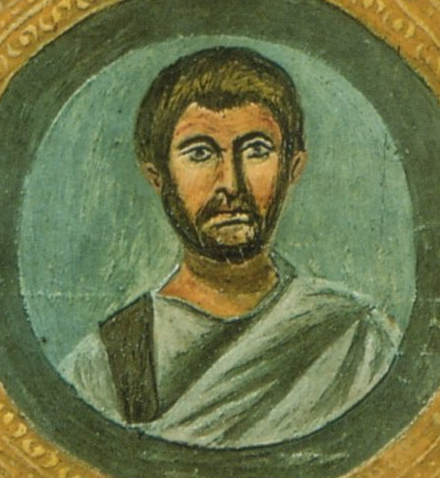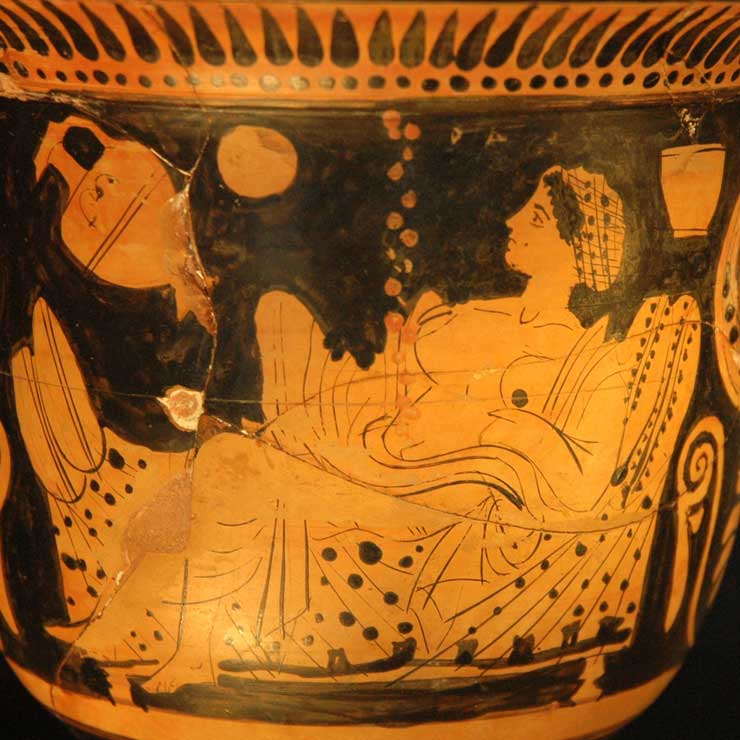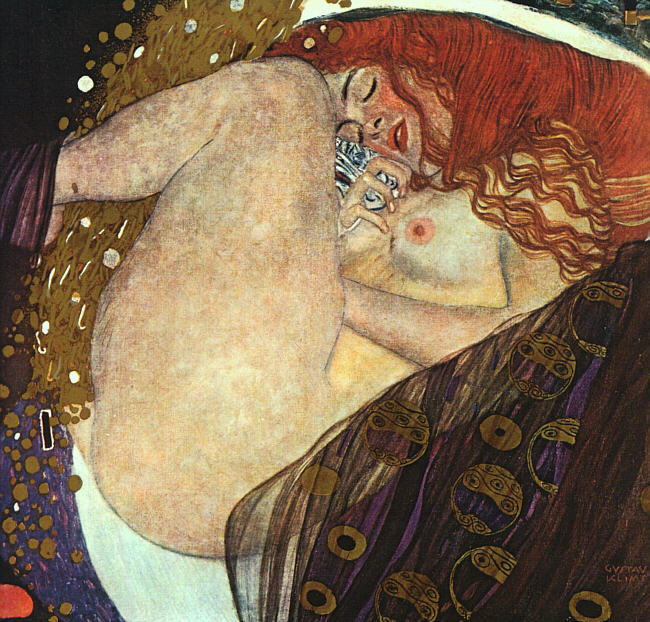CLAS 301b
January 28, 2025
Terence

Portrait of Terence, 9th century CE manuscript
Terence (Publius Terentius Afer, "The African")
- unreliable ancient biography: born 184 BCE (?) in Carthage (?); taken as "good looking slave" to Rome (?); Terence dies 159 BCE during trip to Greece to get scripts of Menander (?)
- 6 comedies in 160s BCE preserved with production notes
- Terence's association with powerful Romans ("our playwright . . . aims to please / As many distinguished citizens as he can", Eunuchus 1-2) – patronage?
- Terence closely follows Greek New Comedy models ("Roman Menander"): less verbal play & farce than Plautus, no song, plain language; interest in psychology of characters (inner feelings, motivations, realistic speech & thought patterns; female characters)
- metatheater more subtle, e.g. Pythias to Parmeno, "I actually used to think you were a very clever fellow" (i.e. a clever comic slave, 1011); less interaction between actors and audience (as in Pseudolus)

Gutiérrez Arribas, Fountain of Cybele (Madrid, ca. 1760)
- Eunuchus, 161 BCE: festival of the Magna Mater (as Pseudolus in 191 BCE), Cybele's "un-manly" eunuch priests in attendance, exotic cult in Rome

Cybele's consort Attis
- Terence's prologues: no exposition of plot, esoteric literary debates about use of Greek & Roman sources; rival (Luscius of Lanuvium), "a certain someone . . . who takes good Greek plays and converts them into bad Latin ones / By translating accurately enough but far too literally" (4ff.) – emergence of Roman literary establishment
- usual purist charges: Terence's "theft" of Latin sources, "contamination" of Greek sources in formative years of Latin literature
Eunuchus 19-41 (prologist defends Terence against rival's charges)
The play we’re about to perform is Menander’s Eunuch.
After the aediles purchased it,
He arranged a little sneak preview for himself.
The presiding magistrate showed up, the rehearsal began,
And our friend shouts out: “A thief, not a playwright, composed this play,
But he’s not pulling the wool over my eyes!
There’s an old play called The Flatterer. Naevius and Plautus [lost Roman plays]
Produced versions of it, and that’s where he’s stolen the characters
Of the parasite and the soldier from.” If our playwright’s guilty as charged,
This is an oversight, not an intent to commit theft!
You can all decide for yourselves if this is so soon enough.
The original version of The Flatterer is by Menander.
There’s a fawning parasite and a braggart soldier in it.
Our playwright does not deny that he transferred these characters
From the Greek play to his own Eunuch. But he categorically denies
Any knowledge of the existence of the two previous Latin plays.
And besides, if he’s denied the right to use the same characters as other writers,
Wouldn’t he also be prohibited from scripting in the role of a running slave,
Or from bringing virtuous wives, nasty prostitutes,
A hungry parasite, and a braggart soldier on stage,
Or having a baby passed off as someone’s, an old man tricked by a slave,
Or including love, hate, and suspicion at all?
The bottom line: you can’t say anything that’s never been said before.
- Terence and intertextuality "win" debate (historically)
- cast of main characters: Thais (meretrix)? Phaedria (adulescens)? Parmeno (servus)? Chaerea (ephebe)? Gnatho (parasite) & Thraso (soldier) – effect of adding pair to Terence's Menandrean source?
- Thais's complex motivations (Pamphila, raised by Thais's mother "like her own daughter", 117)? other characters' suspicions of Thais (comic stereotype)?
Eunuchus 197-202 (Thais's monologue)
Maybe he doesn't put much faith in me
And guages me by the character of the other women here.
I can say with absolute certainty and honesty
That I haven't lied to Phaedria
And no man is closer to my heart than he is.
Everything I've done here I've done for this girl.
- Scene 5: plot hatched (Parmeno) – costume, acting, Chaerea's role as Dorus?
- Scene 10: the rapist's celebration


L: Danaë & Zeus (South Italian krater, 5th century BCE); R: Gustav Klimt, Danaë (1907)
- usual treatment of rape in New Comedy: 9 months prior to play (alcohol, nighttime festival "fog"); birth & angry reaction of male guardian > confession of young man, marriage & presumed passage to adulthood – problematic in Eunuchus?
Eunuchus 580-598 (Chaerea, still in costume, brags to Antipho)
Chaerea
“I’m off to dinner,”
She says, and takes some maids with her. Just a few of the newer ones
Were left behind to tend to the girl. They start the preparations for her bath.
I encouraged them to be quick about it. As that’s happening,
The girl sits in her room looking up at a painting. The subject of it [ekphrasis, description of a work of art, etc.]
Was the story of how Jupiter shot a shower of gold into Danaë’s lap.
I started to gaze at it too. The fact that so long ago he had pulled off
The very same trick made me even more excited:
A god had made himself into a man and secretly penetrated
Another man’s roof, and a woman was tricked via a skylight!
And what a god it was: “He whose thunder rattles the lofty foundations of the sky.” [quotes line of early Roman tragedy]
Could I, a mere mortal, possibly do the same? I could . . . and I did it gladly!
As I’m mulling over all this, the girl is called to her bath.
She left, she bathed, she returned. Then the maids set her down on the bed.
I stood up and awaited my orders. One comes up to me and says: “Hey, Dorus!
Take this fan and create a nice little breeze for her while we take our baths.
You can take a bath if you want when we’re done.” I hiss at her and grab the fan.
Antipho
I’d have loved to see that shameless face of yours at that moment!
You must have had quite the demeanor—and so big an ass as you holding that little fan!

- reactions to rape?
Eunuchus 645-646 (Pythias)
The scumbag! It just wasn’t enough for him to have his way with her!
He had to rip up the poor girl’s clothes and tear her hair out on top of it all!
Eunuchus 658-660 (Pythias)
Whatever he was, all the evidence clearly shows he did what he did.
The girl’s all in tears, and can’t even say what happened when you ask her.
But that paragon of manhood? Nowhere to be found!
Eunuchus 820 (Thais)
The girl's clothing is torn, she's crying, and won't say a word.
GROUPS
- final outcomes (Scene 26) negotiated by Gnatho: Thraso & Gnatho? Thais?
- Terence's critique of New Comedy conventions (rape, clever slave?); hyper-aggressive Roman masculinity?
- a modern reception of Eunuchus:
In a speech before the Senate Foreign Relations Committee on January 13, 2009 in which she assesses current and future American foreign policy, Secretary of State Hillary Clinton cites Roman political scientist Thraso:
I believe that American leadership has been wanting, but is still wanted. We must use what has been called 'smart power,' the full range of tools at our disposal—diplomatic, economic, military, political, legal, and cultural—picking the right tool, or combination of tools, for each situation. With smart power, diplomacy will be the vanguard of foreign policy. This is not a radical idea. The ancient Roman poet Terence, who was born a slave and rose to become one of the great voices of his time, declared that 'in every endeavor, the seemly course for wise men is to try persuasion first.'
Clinton here refers to Eunuchus 789, “A wise man should pursue all options before resorting to force”






